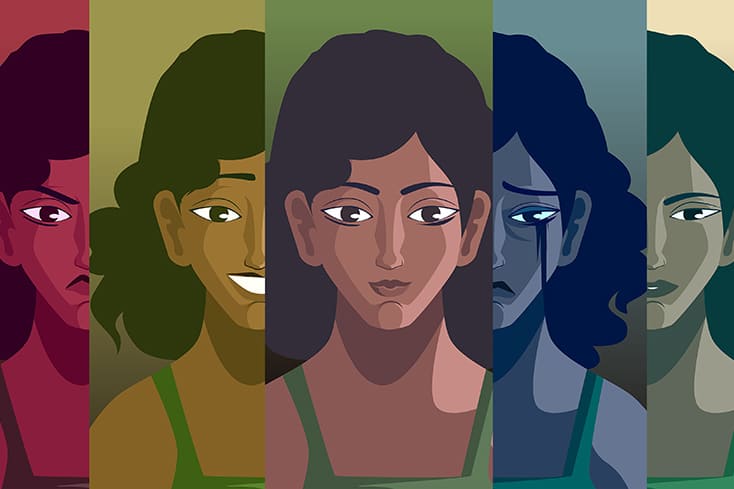June 28, 2021
By Valéry Brosseau

As any writer or producer knows, dramatic storytelling often relies on shock value. Perhaps an opening scene requires unpredictable behavior or violence to keep the audience engaged and surprised. However, Hollywood often tells its stories at the expense of accuracy, dignity and compassion — particularly compassion for people living with mental illness. Far too often, we see the media romanticizing suicide and self-harm and turning destructive behaviors into beautifully sad vignettes, painting characters as desirably misunderstood and in need of rescue.
When TV shows and movies portray a “crazy” female character, they tend to use borderline personality disorder (BPD) as the character’s diagnosis. While suicidality and self-harm are often symptoms of BPD, the disorder is more complex than the self-centered behavior and self-destructive patterns we see on our screens.
As a person diagnosed with BPD, I am growing tired of seeing a one-dimensional version of my disorder for the sake of a dramatic season finale, and I want to encourage more accurate and effective representations of mental health conditions in pop culture.
How Pop Culture Lacks Empathy
The problem with many of the BPD depictions we see on TV is that they fail to consider the totality of the character’s lived experience. Instead, they offer an incomplete view of the person, usually through the lens of another character’s fear and bewilderment.
This is where popular culture fails those of us with mental illness — in representations that lack empathy. Characters with BPD seem to be written for the sake of complicating a storyline, and writers rarely consult people with lived experience to ensure accuracy and to develop a full understanding of BPD’s challenges.
One particular representation stands out as a failure in this regard: Rebecca Pope, a character with BPD on the third and fourth seasons of “Grey’s Anatomy.” Pope, who survives a traumatic accident and devastating crush injuries before being transferred to Seattle Grace Hospital, is portrayed as a burden to the doctors treating her. The initial episodes do little to explore the personal and emotional experience behind her symptoms and behaviors. She quickly devolves from amnesia to delusions and self-destructive behaviors.
She becomes increasingly unstable, demonstrates an inability to care for herself and eventually attempts suicide, devastating the doctor who cared for her. This portrayal entirely bypasses the character’s emotions, and what she must be experiencing to act this way, and focuses purely on how her behaviors harmed other characters.
In far too many media depictions of BPD, the storylines focus on harmful behavior that will shock an audience. Rarely do they focus on the experience of the character with BPD.
How Pop Culture Could Improve
BPD is highly stigmatized, even within the medical community. Mental health practitioners often describe patients with BPD as “manipulative, difficult and dramatic.” Indeed, some therapists even refuse to work with people exhibiting symptoms of BPD, as they believe such patients would be too difficult to treat.
As someone who lives with the everyday consequences of this stigma, I want people to know that people with BPD are not consciously manipulative. They are asking for their needs to be met in the best way they know how and, sometimes, that is not in the most effective or healthy manner.
Another component of the condition that gets lost in Hollywood drama is that people with BPD often feel things very intensely, and it takes time for them to cool down and return to a steady baseline. This can make processing emotions very painful and difficult. I often tell people that having BPD feels like having a constant emotional sunburn with an itchy sweater on top.
Ultimately, I wish to see are characters with BPD showing their inner turmoil and taking the audience on their journey to understand and manage their behaviors. This kind of portrayal should emphasize characters’ feelings and significant emotional challenges. Moreover, this representation would not focus solely on symptoms and destructive behaviors, but also highlight the emotions and needs that prompt those behaviors.
With this approach, the audience is encouraged to understand the character rather than vilify them.
Speaking Up for Better Representation in Media
Respectful and accurate representation of any mental illness or disability can only be accomplished by involving people with lived experience. Creating fully-formed characters requires curiosity, empathy and a willingness to understand an experience different from our own. Consulting people with lived experience is a critical first step in portraying mental illness on screen.
BPD is not an easy condition to live with. Many of us who have the diagnosis are often acutely aware of our ineffective behaviors and work hard to manage them and mitigate any harmful outcomes. TV shows and films that portray us as volatile, manipulative and “crazy” only compound our struggles.
Representing different conditions in TV shows, movies, etc., should aim to promote diversity and understanding. We need to hold the media accountable for the material they produce, and we need to speak up when on-screen portrayals of mental illness are disrespectful or rob people of their dignity. We deserve better.
Valéry Brosseau is a mental health writer, speaker and coach. She delivers talks and workshops using both her lived experience and her training and education to inform people on mental illness and help break down stigma. For more on her background and services, visit www.valerybrosseau.com.
Submit To The NAMI Blog
We’re always accepting submissions to the NAMI Blog! We feature the latest research, stories of recovery, ways to end stigma and strategies for living well with mental illness. Most importantly: We feature your voices.
LEARN MORE